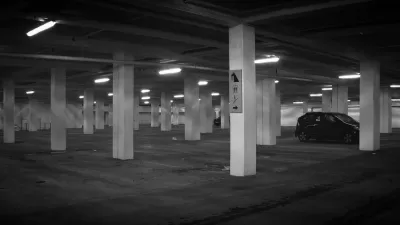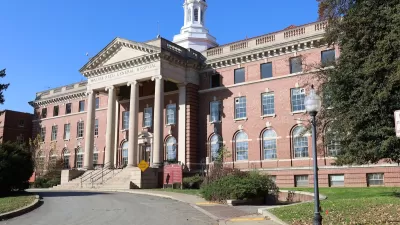The urban landscape could change significantly as cities and transportation systems evolve. Planners are envisioning what that would mean for parking and what decisions need to be made now.

In the fast-changing world of mobility, planners are thinking differently about parking, either doing away with it altogether or reconceptualizing the long-term uses of parking structures, writes John R. Quain.
Cities like Davis, California, are sparing taxpayers the burdensome cost of parking garages by deciding not to build them. Instead of providing more parking, the focus is on pricing street parking to more effectively manage supply and demand.
Another approach picking up steam is adaptive reuse, where structures are designed with the long-term goal of repurposing them down the road. Planning involves thinking ahead about ceiling heights, floor plans, and ways to incorporate plumbing and electrical systems into buildings to make future conversions easier and less costly.
"A Hudson Pacific Properties office complex going up on Sunset Boulevard in Los Angeles, for example, will have a dedicated ride-share drop-off lobby and two floors of parking that can be converted into office space in the future," says Quain.
FULL STORY: Smart city planners are rethinking parking by getting rid of it

Alabama: Trump Terminates Settlements for Black Communities Harmed By Raw Sewage
Trump deemed the landmark civil rights agreement “illegal DEI and environmental justice policy.”

Study: Maui’s Plan to Convert Vacation Rentals to Long-Term Housing Could Cause Nearly $1 Billion Economic Loss
The plan would reduce visitor accommodation by 25% resulting in 1,900 jobs lost.

Planetizen Federal Action Tracker
A weekly monitor of how Trump’s orders and actions are impacting planners and planning in America.

Wind Energy on the Rise Despite Federal Policy Reversal
The Trump administration is revoking federal support for renewable energy, but demand for new projects continues unabated.

Passengers Flock to Caltrain After Electrification
The new electric trains are running faster and more reliably, leading to strong ridership growth on the Bay Area rail system.

Texas Churches Rally Behind ‘Yes in God’s Back Yard’ Legislation
Religious leaders want the state to reduce zoning regulations to streamline leasing church-owned land to housing developers.
Urban Design for Planners 1: Software Tools
This six-course series explores essential urban design concepts using open source software and equips planners with the tools they need to participate fully in the urban design process.
Planning for Universal Design
Learn the tools for implementing Universal Design in planning regulations.
Caltrans
Smith Gee Studio
Institute for Housing and Urban Development Studies (IHS)
City of Grandview
Harvard GSD Executive Education
Toledo-Lucas County Plan Commissions
Salt Lake City
NYU Wagner Graduate School of Public Service





























